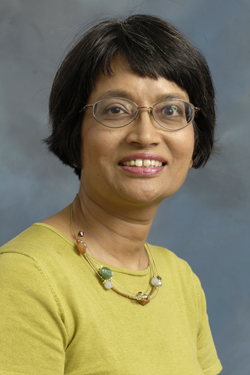Arnold School study: Training black physicians to do colonoscopies may reduce colon cancer deaths
March 16, 2012
 Sudha Xirasagar
Sudha Xirasagar
Nobody likes to talk about a colonoscopy, much less get one.
Sure, there’s the “ick” factor.
But for certain segments of the population, including African Americans and other medically underserved groups, “ick” is the least of the hurdles and is often overshadowed by costs and access.
According to a study by researchers at the Arnold School of Public Health at the University of South Carolina and published in the journal, Cancer, training more African-American primary care physicians to do colonoscopies could improve access and help reduce colorectal cancer disparities.
The study, led by Dr. Sudha Xirasagar, an associate professor in the Department of Health Services Policy and Management, and Dr. James Hébert, director of USC’s Cancer Prevention and Control Program, shows that African-American primary care physicians trained to do colonoscopies significantly increased their African-American patients’ colonoscopy screening rates.
“These findings are noteworthy, given the nationwide gap between specialist availability and the screening-eligible population,” Xirasagar said. “Approximately 23 million people nationwide are eligible to be screened, while the current specialist capacity has been providing about 12 million.”
Xirasagar said that increasing the number of African-American primary care physicians who are trained to perform colonoscopies improves access and lowers out-of-pocket costs for patients. The majority of colonoscopies are done by gastroenterologists.
The increase in African-American patients who have had a colonoscopy screening also support an emerging consensus that African-Americans patients may be more comfortable with African-American physicians, particularly for certain types of procedures.
“This is significant news,” Hébert said. “Previous studies show that minority physicians are a key group for addressing health disparities, particularly when invasive procedures are involved. Minority patients who perceive race-based medical discrimination by their provider have lower screening rates than those who do not. Race concordance is an important driver of minority patients’ trust in their physician and in the discussion of sensitive personal health matters.”
Nationally, African Americans have a 12.3-percent higher incidence of colorectal cancer than whites. In South Carolina, the disparity is wider, with a 33-percent and 30-percent higher incidence among African-American men and women, respectively. The mortality rate differences are grimmer: 57 percent higher in men and 40 percent higher in women.
The research team examined patient charts of colonoscopy-trained African American primary care physicians. They determined the percentage of patients who were eligible for a screening colonoscopy and who actually got a colonoscopy after the physician started his or her colonoscopy training. They compared that figure to pre-training rates.
Patient eligibility was based on age, whether the patient had undergone a colonoscopy and whether the patient had visited the office as a patient. The researchers also looked at gender, race, insurance coverage and, if so, what type of insurance the patient had, including Medicare and Medicaid.
They found that the screening rate for African-American males jumped sharply – five times higher, from 10.4 percent before the physician before training to 52.8 percent after training began. In comparison, the rate for white males changed from 18.2 percent to 25 percent, not enough to be significantly different.
“This jump in screening tells us that colonoscopy rates can be improved for African Americans by training more primary care physicians how to do colonoscopies,” Xirasagar said.
“These numbers are very encouraging,” Hébert said. “The fact that African-American patients are five times more likely to be screened is very exciting, particularly in a state where colon cancer among this group exceeds the national average.”
In addition to Hébert and Xirasagar, the study team included Dr. Jim Burch, Tom Hurley and Ali Mansaray.
(Margaret Lamb of USC News and Communications contributed this article.)



_01.jpg)
_02.jpg)